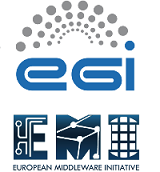Speaker
Impact
As the available grid infrastructure achieves larger community adoption and higher performance, there are an increasing number of user communities with well described needs of an application-specific gateway. Recently various e-science communities tried to create user-specific and user-friendly science gateways on their own way. However, in many cases the attempt failed since the community underestimated the effort needed to create a stable, secure and robust gateway to be used simultaneously by many community member as reliable 24/7 service. The scattered activities among communities also led to lot of redundancy and duplication of efforts. At the end in many cases they have realized that it is much more cost-effective and faster to build the gateway based on an existing generic-purpose DCI gateway. Even those communities that have already successfully deployed their first gateways have identified new requirements and would like to use the latest technologies to keep their research competitive. With our newly developed WS-PGRADE/gUSE feature set we have targeted the following emerging user community requirements: easy and reliable way to build new gateways, upgrade existing gateways to modern technologies, strong customization capabilities, and seamless infrastructure compatibility.
As a result gUSE and WS-PGRADE is already popular for many communities since it helped to lowering of barriers to entry in e-Science environments by researchers. It also increases potential for e-Infrastructure usage by non-specialists as it was demonstrated in the FP6 and FP7 projects (CancerGrid, SHIWA, HP-SEE, MoSGrid).
Description of the work
The gUSE and the WS-PGRADE solutions are tailored for supporting Grid application development and building up e-science gateways.
gUSE is an easily usable highly flexible and scalable co-operative Grid application development infrastructure connecting developers and end-users of grid applications with computational resources of different technologies enabling the design, integration and submission of sophisticated (layered and parameter sweep enabled) workflows spreading parallel among Grids, Web services, Clusters, and eventual local resources of gUSE. It provides a collaborative, community-oriented grid application development environment where Grid application developers and Grid end-users can share workflow graphs, workflow templates and ready-to-run workflow applications via a workflow repository.
WS-PGRADE portal is the second generation a generic purpose e-science portal that introduces many advanced features both at the workflow and architecture level. In this presentation we are focusing on the following feature set of the WS-PGRADE/gUSE solution offered for the various types of user and NGI user communities:
-Scientific gateway services. We will show how the solution supports unified access to and seamless integration of the underlying networking, computing and data infrastructures and services for all the major DCI infrastructures (local and remote clusters, supercomputers, local and volunteer DGs, Grids, public and private academic or commercial Clouds).
-Developer and end-user services. We will detail how the solution provides support for the design, development and deployment of user-friendly interfaces which abstract service provision from the underlying infrastructure complexities and specific implementations through the use of various Web technologies.
-Baseline technologies. We will enumerate the additional feature set, which facilitates community level collaboration among developers and end-users , such as support of various repositories.
Conclusions
The developed new feature set of WS-PGRADE/gUSE can be categorized into scientific gateway services, developer and end-user services and baseline technologies. It provides support to build up, customize and integrate easy and reliable way new gateways and to upgrade older existing gateway solutions to recent technologies.
It also further facilitates and speed up the development of community owned application-specific gateways and support application developers, end-users/e-scientists and e-infrastructure operators in their work. New user communities are supported strongly during their e-science gateway development in a collaborative way. As a result wide range of other European user community benefits already from the improved e-science services to be provided by the WS-PGRADE/gUSE solutions. In addition the developed feature set also bridge into the commercial cloud application domain, allowing scientists and commercial users to use clouds and grids together.
Overview
E-science Gateways are the primary solutions dedicated to support end-users without grid knowledge to do their research on distributed grid infrastructure. Due to the wide range of research fields, generic grid workflow management systems/portal services should be flexible enough to support the different requirements both at front-end and back-end side. Previously the importance of science gateways was overlooked. This required a huge (time and skill) overhead in usage and development due to the required complete understanding of various distributed infrastructure technologies and solutions. As a result adoption of these e-infrastructures has been below expectation until today. Recognizing the problem many attempts have been made to create user/community-specific and user-friendly science gateways for the various e-science communities. In this oral presentation we introduce the newly developed features of gUSE a Grid User Support Environment and the WS-PGRADE portal solutions.
URL
http://www.guse.hu/ , http://www.wspgrade.hu

